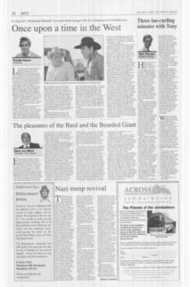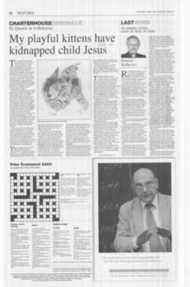Page 3, 6th January 2006
Page 3

Report an error
Noticed an error on this page?If you've noticed an error in this article please click here to report it.
Tags
Share
Related articles
Ambassador's Eu Appeal
No Catholic Politician May Vote Against Life, Says Pope
Human Rights Call To Envoy
Government Downgrades Embassy To The Holy See
Benedict's Message Delights Ambassadors
Britain asks Pope to support EU expansion
New ambassador calls for a 'community of values', writes Freddy Gray, but is sharply reminded that such values must include a respect for life
THE NEW BRITISH Ambassador to the Holy See has issued a strung appeal in favour of expanding the European Union.
Commentators have interpreted the speech as a "gentle challenge" to Pope Benedict XVI over the admission of Turkey to the EU — a prospect that the Pope opposed before his election last year.
As he presented his credentials to the Pontiff, Francis Campbell told the Pontiff that by extending the EU's frontiers, the United Kingdom believes that we are not just aiding states to be more stable, democratic, tolerant and respectful of human rights. but also individuals to raise their horizons and achieve their potentials".
He said: "What sort of Europe are we creating? The 11K does not believe that it is one that will result in a culture of nihilism without traditions or identities. Rather it is, and will continue to be, a community of values — a pluralistic community."
Mr Campbell. Britain's youngest ambassador, aged only 35. did not specifically mention Turkey, an omission that was a relief to members of the Vatican Secretariat of State, according to one anonymous official. Yet the remarks were widely understood to be a reminder of Britain's support for Turkey's bid to join the Ell.
Commentators observed that the speech showed how Mr Campbell. the first Catholic ambassador to the Holy See since the Protestant Reformation, would not shrink from representing his Government's interests.
The speech is thought to have caused a stir in diplomatic circles. There is already reported to be a conflict in the Holy Se,e over whether or not Turkey should be admitted to the EU.
Some Church diplomats, echoing Cardinal Ratzinger's corn
meats to a French newspaper in 2004, believe that Turkey's Islamic culture means it is unsuited to join the Union because the alliance is founded on a common Christian heritage.
Others believe, however, that Turkey's inclusion would prevent further division between East and West on religious lines. They hope that Turkey will become a model Muslim state and respect human rights and religious freedoms.
It is uncertain whether the Pope's opinion on the matter. expressed before his elevation, will become Vatican policy.
Benedict is expected to travel to Turkey later this year to see the Patriarch of Constantinople, a meeting that observers believe represents an ideal opportunity to revisit the controversial question.
In his response to Mr Campbell's speech, Benedict did not reflect on the European Union, but pressed the ambassador on the importance of defending human life in Britain, telling him that shared European values have traditionally included a respect for life.
The Pontiff urged the new ambassador to "recognise and protect the sanctity of life from conception until natural death." a reference to Britain's appalling record on abortion and other life issues, including the country's leading rule in stem cell research and attempts at human cloning.
He said: "[We are obliged] to consider carefully the ethical implications of scientific and technological progress, particularly in the field of medical research and genetic engineering."
However, the Pope applauded Britain for fighting poverty in the Third World. "I pray that this effective solidarity with our suffering brothers and sisters will be maintained and deepened in years to come," he said.
Both Benedict and Mr Campbell spoke about ecumenism and interreligious dialogue. Mr Campbell said that Great Britain, had long experienced "strife and discord between and within faiths". "On the whole, however, inter-faith and inter-religious relations within the UK remain strong. But our history leaves us more aware than most of the central importance of respectful relationships and meaningful dialogue between faith groups".
In his reply. Benedict said that the London bombings showed that Britain still had to cope with indiscriminate violence associated with religion. "I wish to assure you of the continuing support of the Church as you seek solutions to the underlying tensions that give rise to such atrocities," he said.
"The Catholic population in Great Britain is already marked by a high degree of ethnic diversity and is eager to play its part in furthering reconciliation and harmony between the various racial groups present in your country."
On ecumenical matters, Benedict reflected upon the "sad divisions" that have affected Christianity in Britain as a result of the Reformation.
"The wounds resulting from more than four centuries of separation cannot be healed without determined efforts, perseverance, and above all, prayer," he said.
"I give thanks to God for the progress that has been made in recent years in the various ecumenical dialogues, and I encourage all those involved in this work never to rest content with partial solutions but to keep firmly in view the goal of full visible unity among Christians."
He added that he was pleased that progress towards peace in Northern Ireland.
Benedict also told the ambassador that the Holy See "greatly values" its formal links with Great Britain, which were re-established in 1914, and given full status in 1982. "These relations have made possible a significant degree of cooperation in the service of peace and justice," he said.
Editorial Comment: Page 11
blog comments powered by Disqus

















